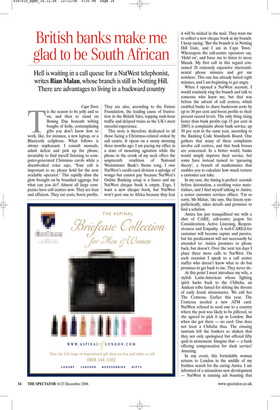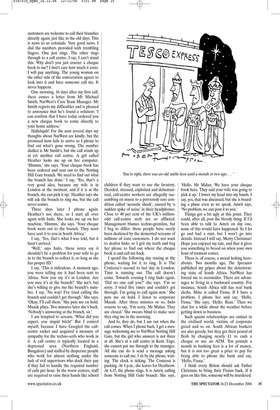British banks make me glad to be South African
Hell is waiting in a call queue for a NatWest telephonist, writes Rian Malan, whose branch is still in Notting Hill. There are advantages to living in a backward country
Cape Town
Tis the season to be jolly and so on, and then to stand on Boxing Day beneath wilting boughs of holly, contemplating gifts you don’t know how to work, like, for instance, a new laptop, or a Bluetooth cellphone. What follows is always unpleasant. I consult manuals, admit defeat and pick up the phone, invariably to find myself listening to computer-generated Christmas carols while a disembodied voice says, ‘Your call is important to us; please hold for the next available operator.’ This rapidly dims the glow brought on by brandied eggnogs, but what can you do? Almost all large companies have call centres now. They are lean and efficient. They cut costs, boost profits. They are also, according to the Future Foundation, the leading cause of frustration in the British Isles, topping rush-hour traffic and delayed trains as the UK’s most stressful experience.
This story is therefore dedicated to all those facing a Christmas-related ordeal by call centre. It opens on a sunny morning three months ago. I am pacing my office in a state of mounting agitation while the phone in the crook of my neck offers the umpteenth rendition of National Westminster Bank’s theme song. I owe NatWest’s credit-card division a splodge of wonga but cannot pay because NatWest’s Online Banking setup is a fiasco and my NatWest cheque book is empty. Ergo, I want a new cheque book, but NatWest won’t post one to Africa because they fear it will be nicked in the mail. They want me to collect a new cheque book at my branch. I keep saying, ‘But the branch is in Notting Hill Gate, and I am in Cape Town.’ Whereupon the call-centre operators say, ‘Hold on’, and force me to listen to more Muzak. My first call in this regard consumed 28 ruinously expensive intercontinental phone minutes and got me nowhere. This one has already lasted eight minutes, and I am beginning to get angry.
When I opened a NatWest account, I would routinely ring the branch and talk to someone who knew me, but that was before the advent of call centres, which enabled banks to shave backroom costs by up to 30 per cent and boost profits to their present record levels. The only thing rising faster than bank profits (up 15 per cent in 2005) is complaints about bank service, up 50 per cent in the same year, according to the Banking Code Standards Board. One gathers that many of these complaints involve call centres, and that bank bosses are concerned. In a better world, banks would simply improve their service, but some have instead turned to ‘queueing theory’, a branch of mathematics that enables you to calculate how much torture a customer can take.
In my case, the timing is perfect: seconds before detonation, a soothing voice materialises, and I find myself talking to Amira, a senior customer services officer. ‘I’m so sorry, Mr Malan,’ she says. She listens sympathetically, takes details and promises to find a solution.
Amira has just tranquillised me with a shot of CARE, call-centre jargon for Consideration, Active Listening, Responsiveness and Empathy. A well-CAREd-for customer will become supine and passive, but his predicament will not necessarily be attended to: Amira promises to phone back, but doesn’t. Over the next ten days I place three more calls to NatWest. On each occasion I speak to a call centre staffer who doesn’t know what to do but promises to get back to me. They never do.
At this point I must introduce my wife, a stylish Latin-American whose fighting spirit harks back to the Chibcha, an Andean tribe famed for slitting the throats of early Jesuit missionaries. We call her The Contessa. Earlier this year, The Contessa needed a new ATM card. NatWest refused to send one to a country where the post was likely to be pilfered, so she agreed to pick it up in London. But when she got there — no card. One does not treat a Chibcha thus. The ensuing tantrum left the bankers so shaken that they not only apologised but offered fifty quid in atonement. Imagine that — a bank offering compensation for slack service! Amazing.
In any event, this formidable woman returns to London in the middle of my fruitless search for the caring Amira. I am informed of a miraculous new development — NatWest is running ads boasting that customers are welcome to call their branches directly again, just like in the old days. This is news to us colonials. Very good news. I dial the numbers provided with trembling fingers. One just rings. The other rings through to a call centre. I say, I can’t stand this. Why don’t you just courier a cheque book to me? I don’t care how much it costs. I will pay anything. The young woman on the other side of the conversation agrees to look into it and have someone call me. It never happens.
One morning, 16 days after my first call, there comes a letter from Mr Michael Smith, NatWest’s Care Team Manager. Mr Smith regrets my difficulties and is pleased to announce that he’s found a solution: ‘I can confirm that I have today ordered you a new cheque book to come directly to your home address.’ Hallelujah! For the next several days my thoughts about NatWest are kindly, but the promised item fails to arrive so I phone to find out what’s gone wrong. The number dialled is Mr Smith’s, but the call winds up at yet another call centre. A girl called Heather looks me up on her computer. ‘Hmmm,’ she says, ‘Your cheque book has been ordered and sent out to the Notting Hill Gate branch. We need to find out what the branch has done.’ I say, ‘Yes, that’s a very good idea, because my wife is in London at the moment, and if it is at the branch, she can pick it up.’ Heather says she will ask the branch to ring me, but the call never comes.
Three days later I phone again. Heather’s not there, so I start all over again with Indo. She looks me up on her machine. ‘Hmmm,’ she says. ‘Your cheque book went out to the branch. They must have sent it to you in South Africa.’ I say, ‘Yes, that’s what I was told, but it hasn’t arrived.’ ‘Well,’ says Indo, ‘these notes say it shouldn’t be a problem for your wife to go in to the branch to collect it, so long as she has proper ID.’ I say, ‘This is ridiculous. A moment ago, you were telling me it had been sent to Africa. Now you say it’s in London. Are you sure it’s at the branch?’ She isn’t, but she’s willing to give me the branch’s number. I say, ‘No way! I’ve tried calling the branch and couldn’t get through.’ She says, ‘Okay, I’ll call them.’ She puts me on hold. Muzak plays. Two minutes later she’s back. ‘Nobody’s answering at the branch, sir.’ I am tempted to scream, ‘What did you expect, you stupid bitch!’ But I control myself, because I have Googled the callcentre racket and acquired a measure of sympathy for the techno-serfs who work in it. A call centre is typically located in a depressed area (Northern England, Bangalore) and staffed by desperate people who work for almost nothing under the lash of evil supervisors who dock their pay if they fail to handle the required number of calls per hour. In the worst centres, staff are required to raise their hands like school children if they want to use the lavatory. Derided, stressed, exploited and dehumanised, call-centre workers are allegedly succumbing en masse to a previously rare condition called ‘acoustic shock’, caused by ‘a sudden spike of noise’ in their headphones. Close to 40 per cent of the UK’s millionodd call-centre serfs are so afflicted. Management blames techno-gremlins, but I beg to differ: these people have surely been deafened by the demented screams of millions of irate customers. I do not want to deafen Indo, so I grit my teeth and beg her please to find out where the cheque book is and call me back.
I spend the following day staring at the phone, waiting for it to ring. It is The Contessa’s second to last day in London. Time is running out. The call doesn’t come. Towards evening I ring Indo again. ‘Did no one call you?’ she says. ‘I’m so sorry. I tried five times and couldn’t get through. I’m going to call again now.’ She puts me on hold. I listen to corporate Muzak. After three minutes or so, Indo returns to say, ‘I’m sorry, Mr Malan. They are closed.’ She swears blind to make sure they ring me in the morning.
And lo, they do, but I am out when the call comes. When I phone back, I get a message welcoming me to NatWest Notting Hill Gate, but the girl who answers is not there at all. She’s at a call centre in Kent. Ergo, she cannot put me through to the manager. All she can do is send a message asking someone to call me. I sit by the phone, waiting. The clock is ticking. The Contessa is packing. At 4 p.m., she leaves for Heathrow. At 4.15, the phone rings. It is Amrit, calling from Notting Hill Gate branch. She says, ‘Hello, Mr Malan. We have your cheque book here. They said your wife was going to pick it up.’ I lower my head into my hands. I say, yes, that was discussed, but she is boarding a plane even as we speak. Amrit says, ‘No problem, we can post it to you.’ Things got a bit ugly at this point. They could, after all, post the bloody thing. If I’d been able to talk to Amrit on day one, none of this would have happened. So I let go and had a rant, but I won’t go into details. Instead I will say, Merry Christmas! Hope you enjoyed my tale, and that it gives you something to brood on when your own hour of torment comes.
There is, of course, a moral lurking hereabouts. Two months ago, The Spectator published my gripes about the deteriorating state of South Africa. NatWest has forced me to reconsider. There are advantages to living in a backward country. For instance, South Africa still has real bank clerks. Mine is called Fiona. If I have a problem, I phone her and say, ‘Hello, Fiona.’ She says, ‘Hello, Rian.’ Then we chat for a while about the weather before getting down to business.
Such quaint relationships are extinct in the civilised world, victims of corporate greed and so on. South African bankers are also greedy, but they get their pound of flesh by charging nearly £1 to cash a cheque or use an ATM. Ten pounds a month in banking fees is a lot of money, but it is not too great a price to pay for being able to phone the bank and say, ‘Hello, Fiona.’ I think every Briton should ask Father Christmas to bring their Fionas back. If it goes on like this, someone will be murdered.







































































































































 Previous page
Previous page